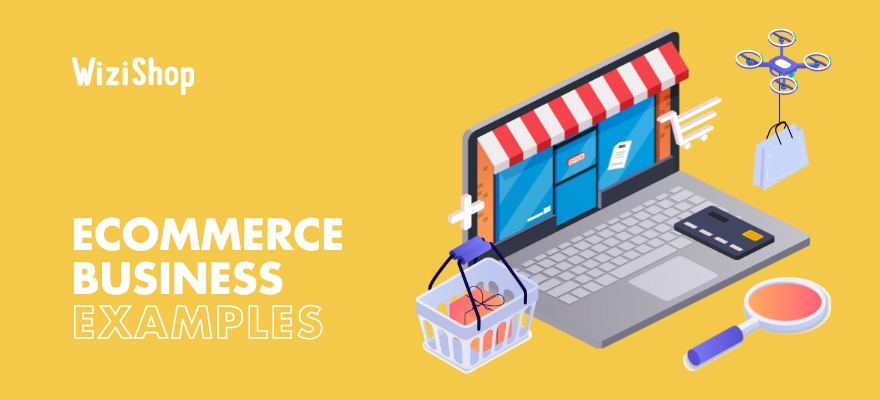As a growing number of shoppers head online to purchase goods and services, the importance of ecommerce becomes increasingly clear. If you’ve been wanting to start your own online sales business, the time to start is now.
However, taking the first step can often be the most difficult, and many would-be ecommerce entrepreneurs get discouraged in the initial key stages of launching their brands on the web, especially with digital commerce giants like Amazon already dominating the industry...
The good news is that you don't need to compete with Amazon to attract customers and be successful in ecommerce. While you'll probably have at least a few other companies competing with your business, with the right product and marketing strategy, you'll be able to stand out in the market, build consumer trust, and achieve success.
Whether you’re trying to decide what types of products to sell via your online store or how to run your future ecommerce business, sometimes all you need is just a bit of inspiration to help spark your next great idea!
In this article, we will take a look at 11 great examples of ecommerce businesses to launch along with ecommerce companies that have found success in their prospective niches. Studying these digital commerce examples is a great way to learn about the wide range of strategies you can use to transform a mere idea into a profitable business.
What are some ideas of the types of ecommerce businesses you can start?
When you’re looking to start an ecommerce business, you’ll find that there are numerous types of ecommerce out there, with a variety of business models from which to choose. What’s more, nearly any product can be sold online these days, giving you countless possibilities as far as exactly what kind of online store to create.
If you don’t know where to begin, consider taking inspiration from the following list of ecommerce business ideas, along with examples of successful brands that have employed various methods to help them get to where they are today!
1. Handmade items
If you already like making things with your hands, be they candles, jewelry, wooden toys, artwork, enamel pins, knitted goods, or other crafts, why not transform your passion into a profitable business by selling your creations on the internet?
Boost your chances of success in digital commerce by showcasing each item’s story and craftsmanship with clear, appealing images and detailed descriptions. You might also opt to offer customizable options for a personal touch.
Although platforms geared toward the buying and selling of handcrafted products like Etsy offer a super-simple, hands-off approach to running an online store, this added convenience comes at a price with hefty fees. Launching your own ecommerce website will be likely to provide you with more control and profitability over the long run.
Don't forget to also build a presence on social media, as the various networks can be great for growing an audience, sharing your process, and engaging customers who value handmade authenticity and quality.
For a successful example of an ecommerce business involving handmade goods, look to Bia Candle Co.! The brand began when founder Bia, while living in Brazil, couldn’t find high-quality candles locally. Her curiosity led her to create her own, and after refining her methods, she launched Bia Candle Co. upon returning to Florida in 2018.
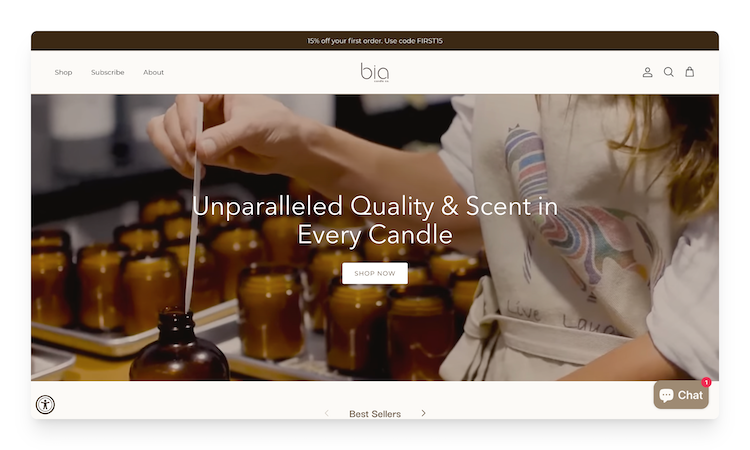
Bia Candle Co. offers luxurious, handcrafted candles made from premium soy wax and natural wicks, providing a safe, long-lasting burn with rich, captivating scents. Known for using more fragrance oil than typical candles, Bia’s products deliver an intensified aromatic experience.
The candles come in eco-friendly packaging and are crafted sustainably in the USA. With a diverse scent range, including floral and woodsy blends, Bia Candle Co. combines artisanal quality with a commitment to safety and sustainability.
2. Sleep-related products
When you consider that over 33% of American adults aren't regularly getting sufficient sleep, according to the U.S. Centers for Disease Control and Prevention, sleep-related items can be excellent niche products for a web commerce venture!
With sleep quality top of mind, items like mattresses, cozy bedding, sleep aids, and calming gadgets are in high demand. People crave restful nights, and they’re willing to invest in them.
If you wish to sell sleep-related items, it's a good idea to curate a range of effective, high-quality products, highlight customer reviews, and offer educational content on better sleep habits. In addition, be sure to optimize for mobile and use soothing, sleep-themed branding to help customers feel relaxed and ready to shop.
Mattress company Casper serves as a particularly inspiring example of a brand selling goods designed to assist consumers in catching more Zs due to its success in disrupting a traditionally brick-and-mortar industry. Combining the revolutionary (at the time) idea of putting a foam mattress inside a box for easy delivery by mail and a stellar content marketing strategy, the online retailer has built up an extensive base of loyal customers.
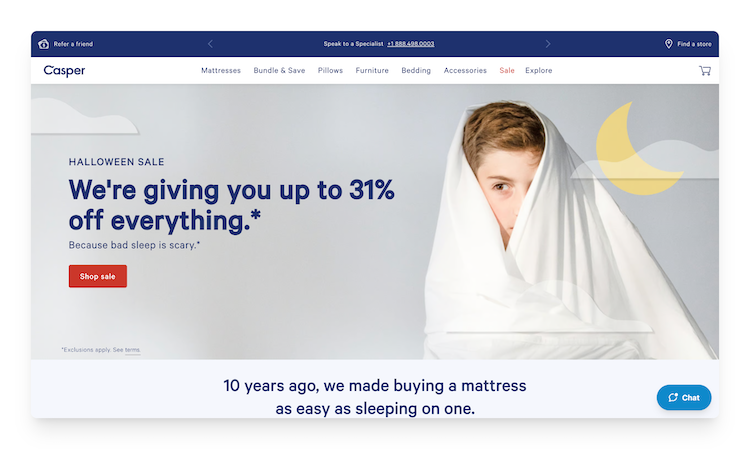
Founded in 2014 by Philip Krim, Neil Parikh, T. Luke Sherwin, Jeff Chapin, and Gabriel Flateman, Casper is headquartered in New York City and currently delivers to the 48 contiguous United States as well as most of Canada. Although best known for selling mattresses, the company also offers pillows, bed frames, bedding, and other sleeping accessories on the website.
Casper has differentiated itself in the mattress industry by providing a plethora of resources and information via numerous content marketing avenues. These powerful tactics help attract site traffic and make Casper one of the top brands people think of when shopping for a mattress.
Detailed product descriptions and comparisons, a mattress quiz that aids site visitors in selecting the best product for their needs in exchange for their email address, a comprehensive blog featuring a variety of mattress- and sleep-related topics, and a generous referral program are just some of the methods the company employs to attract and retain customers.
3. Eyewear
With both fashion and functionality, eyewear appeals to diverse audiences seeking style, screen protection, or vision correction.
The key to success? Offer virtual try-ons so customers can "see" before they buy, provide clear lens options, and showcase style versatility with engaging photos and detailed descriptions. Focus on trendy designs and quality, and add value with content about frame styles, face shapes, and lens types to boost customer confidence.
As is with many business origins, American online eyewear retail company Warby Parker was created to help solve a problem. In this case, the issue was the cost of prescription eyewear. Although glasses are essential items for a significant number of people, founders Neil Blumenthal, Andrew Hunt, David Gilboa, and Jeffrey Raider believed the price for most eyewear options to be quite high, too high for many consumers to comfortably be able to afford.
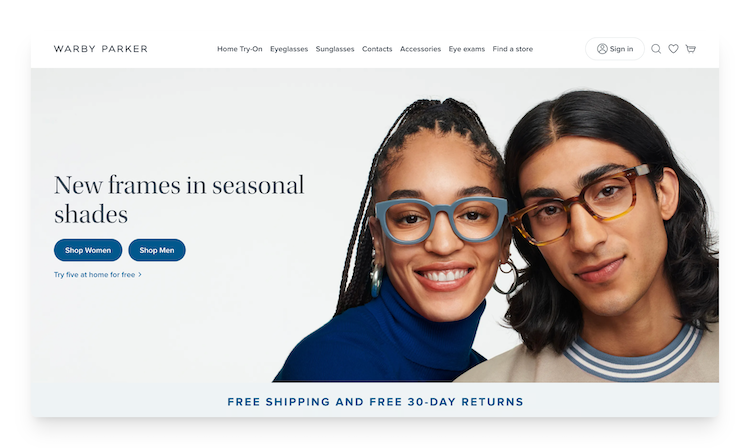
They launched the Warby Parker website in 2010 to provide an alternative solution: high-quality, stylish prescription eyewear that wouldn’t break the bank.
The retailer puts a great focus on the user experience, allowing shoppers to test up to five pairs of glasses at a time at home, with free shipping for both original orders and returns. Visitors to the Warby Parker website can also avail of AR technology, making it possible to try on a pair of glasses virtually before ordering. In addition to regular eyeglasses, sunglasses, contact lenses, and eyewear accessories can also be purchased from the website or one of the many brick-and-mortar stores now available in the US and Canada.
Warby Parker is also known for giving back to others with its Buy a Pair, Give a Pair program. With this initiative, the company donates a pair of glasses to those in need every time that a pair of glasses is purchased. To date, more than 10 million pairs have been distributed since the start of the program.
4. Luggage
People all over the world love the thrill of travel, and quality bags are essential! As remote work expands and travel rebounds, stylish, functional luggage is in high demand.
For a luggage venture, aim to sell a decent range of sizes and styles, from weekenders to durable, sleek rollers. Feature detailed images, packing tips, and highlight each bag’s features, like compartments and materials. With easy returns and clear descriptions, customers will feel ready to roll with confidence!
American retailer Away has definitely made a name for itself in the luggage industry when it comes to online sales, in large part due to its storytelling prowess and high-quality products. With a marketing strategy that centers on celebrating the making of memories and the joy that traveling brings, the company aims to inspire consumers to see more of the world while not having to worry about the quality of their luggage they take with them on their trips.
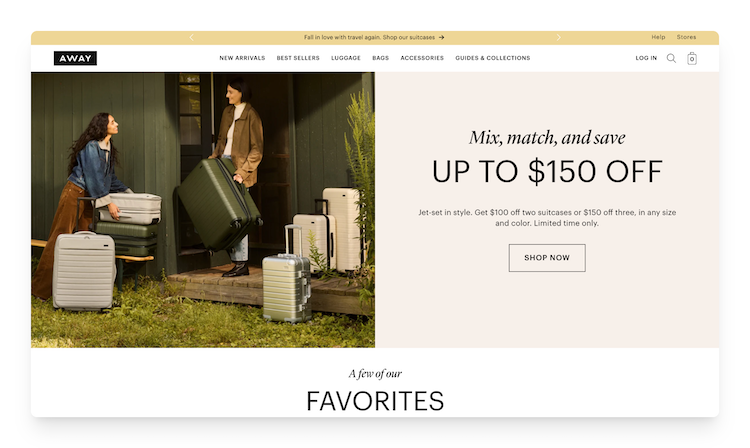
Founded by Steph Korey and Jen Rubio (who met when they worked together as part of Warby Parker’s executive team in 2011) in 2015, Away’s first product was a carry-on suitcase. Known as “The Carry-On,” this piece of luggage was developed based on feedback from a focus group and was designed to be a step up from traditional luggage, featuring thoughtful details to improve the user experience.
Although Away is best known for its suitcases, the company also sells travel bags, travel organizers, and travel accessories. As of today, this ecommerce business ships all across the US, Canada, and the UK.
5. Personal grooming products
With a growing focus on self-care, items like top-notch razors, trimmers, beard oils, and skincare tools are becoming increasingly popular. If this product idea appeals to you for your future ecommerce site, consider supplying a range of high-quality, stylish products for all genders and grooming preferences.
Furthermore, you'll want to create an appealing store experience with clear tutorials, detailed product info, and maintenance tips. You might also think about emphasizing eco-friendly or luxury options to attract a loyal, polished customer base and offering subscriptions for repeat purchases.
Based in Venice, California, Dollar Shave Club is one of the most successful grooming-product ecommerce companies using a subscription model of today. The company delivers razors and other personal grooming products to its customers by mail on a monthly basis. Customers can choose from three available membership plans, which vary in the number and types of items included in the subscription box sent each month, and are able to change their selected plan at any time.
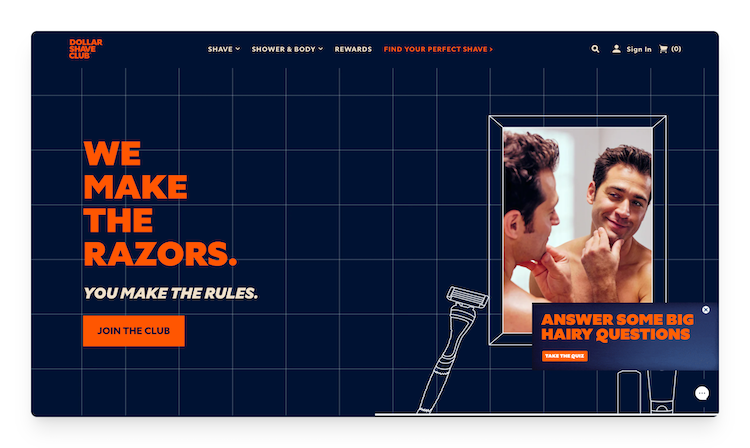
Founded by Mark Levine and Michael Dubin in 2011 after the two discovered their shared frustrations with purchasing expensive razor blades, Dollar Shave Club has grown extensively since its launch. After receiving funding from various investors, the company expanded its product line and was bought by Unilever for what was reported to be $1 billion, just five years after it went live!
While Dollar Shave Club originally sold just razor blades and handles, shoppers are now able to add a variety of other goods to their subscription boxes, such as shaving accessories, hair products, deodorant, cologne, body wash, toothpaste, and more. The company doesn’t make the products it sells, but its popularity with consumers is likely mainly thanks to the affordable items and the convenience it offers.
6. Eco-friendly fashion
Both ecommerce and physical commerce are rife with businesses that focus on fast fashion: inexpensive, trendy clothing and accessories often created using methods that are harmful to the environment and that exploit workers.
Shoppers are increasingly mindful of sustainability, so ethically-made, eco-conscious apparel has major appeal. Focus on showcasing transparent sourcing, highlight sustainable materials, and tell each product’s story to connect with values-driven customers.
Offer versatile, timeless pieces with strong visuals and size guides to reduce returns. Plus, share eco-tips and styling ideas to build a loyal community excited about sustainable fashion. Fashion that feels good and does good—it’s a win-win!
American clothing retailer Everlane has taken a completely different approach by selling high-quality products and offering what they refer to as “radical transparency.”
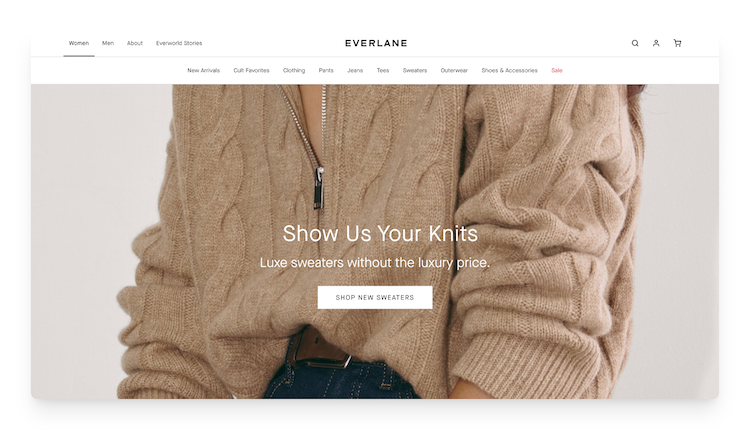
Founded in 2010 by Michael Preysman and Jesse Farmer, Everlane sells men’s and women’s clothing mostly online, but it’s also opened up several brick-and-mortar stores in recent years. Visitors to the brand’s ecommerce website will find detailed product information on each item listed for sale. This includes not just the materials used and care instructions but also where the product was made and transparent pricing, which breaks down the different costs of making the item.
Everlane aims to be as transparent as possible with consumers, concerning both the products it sells and its business practices. This idea continues to strike a chord with shoppers in search of an environmentally and socially conscious alternative to fast fashion that is still affordable.
7. Skin care
With everyone seeking that radiant, healthy skin, demand is high for quality products tailored to diverse needs. To stand out with your skincare brand, aim to sell a range of solutions—from cleansers to serums—catered to various skin types.
Clear, ingredient-focused descriptions, customer reviews, and before-and-after photos build trust. You can add value by providing guides on skincare routines and tips for specific concerns on your ecommerce website. Bonus tip: Consider eco-friendly packaging to appeal to the eco-conscious skincare enthusiast!
Herbivore Botanicals is a natural skincare brand that got its start in the kitchen of Seattle-based couple Julia Wills and Alexander Kummerow in 2011. They’d been searching for natural products that would aid in healing Kummerow’s eczema. Wills began creating homemade soap that was free of toxic ingredients and harmful chemicals, resulting in a product that not only healed Kummerow’s skin but also quickly grew in popularity with her loved ones.
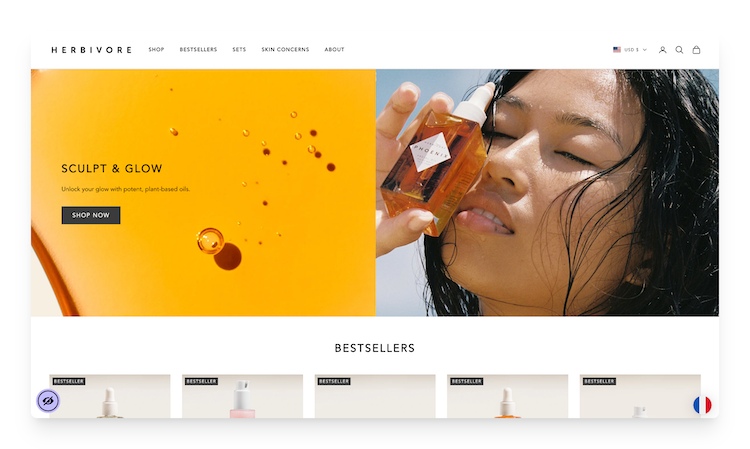
The couple then started selling their creations on Etsy and working on building their brand. They later launched the Herbivore Botanicals website and have since expanded their product line to include facial moisturizers, serums, facial oils, cleansers, masks, mists, scrubs, and more. All of their products are crafted with ethically sourced, natural ingredients and are designed to provide users with noticeable results in addition to an enjoyable, indulgent experience.
Herbivore Botanicals products are never tested on animals, and the company regularly supports social and environmental causes by bringing attention to and donating to various events and organizations. All of this combined with the brand’s active social media presence and Insta-worthy product packaging have brought this ecommerce business tons of success.
8. Pet supplies
As Statista notes, pet market sales in the US have grown consistently in the last few years, increasing from $90.5 billion in 2018 to $147 billion in 2023. With the pet supply industry thriving, pet owners are constantly seeking quality products to keep their furry friends happy and healthy!
The pet supplies you sell can include, for example, food, toys, beds, carriers, grooming items, clothing, leashes, collars, dishes, and cameras for a variety of pets. You could choose to specialize in a particular area, such as a specific product or pet, or you could offer a varied product catalog to appeal to as many pet owners as possible.
Note that if you opt to make your own pet food or treats to sell, you'll need to take note of the regulations concerning the sale of food products in your country. You'll likely need to follow precise food testing and labeling protocols before putting your creations up for sale.
When it comes to ecommerce businesses involving the sale of pet products, American online retailer Chewy is a major success story. Based in Dania Beach, Florida, this company, originally known as Mr. Chewy, was founded in 2011 by Ryan Cohen and Michael Day. After several years of significant growth, the company was purchased by PetSmart in 2017 for the hefty price of $3.35 billion, though it continues to operate as a separate entity.
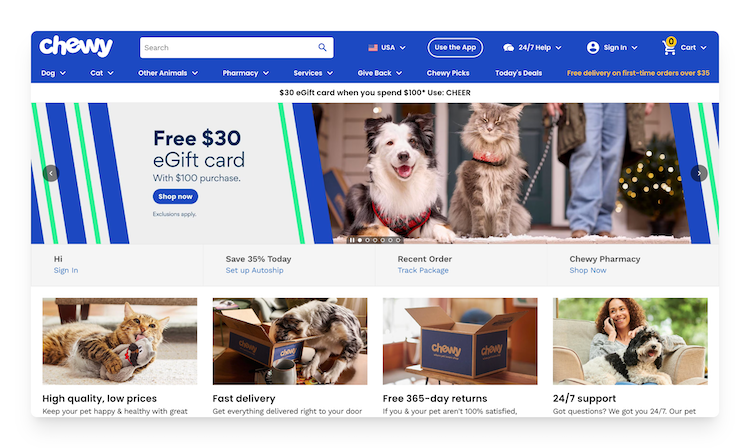
Since its origins, Chewy’s focus has been on putting customers first, always aiming to provide excellent customer service. It currently boasts over 2,000 brands on the company’s website, from which shoppers are able to buy their favorite products for cats, dogs, fish, birds, reptiles, guinea pigs, rabbits, other small animals, horses, and even farm animals like chickens, goats, cows, and more. In 2022, Chewy launched CarePlus to offer pet health insurance and wellness plans to over 20 million customers.
Besides the plethora of product information found on the company website, Chewy further helps to educate and entertain its audience with a blog filled with articles featuring tips, recipes, events, etc. and an active presence on various social networks.
9. Meal kits
Meal kits provide convenience, variety, and a personalized cooking experience, appealing to busy individuals who still crave homemade meals. When selling meal kits via your online store, you'll want to offer diverse options for different diets, ensure fresh, quality ingredients, and prioritize eco-friendly packaging.
You can help your venture stand out with easy-to-follow recipes and flexible subscription plans, perhaps also partnering with local farms or chefs for unique offerings. Engaging customers with seasonal kits and new flavors can keep them coming back for more!
Based in Berlin, Germany, HelloFresh is one of the best-known meal-kit companies in the world. It aims to make meal preparation less stressful for consumers, and its business model consists of preparing the ingredients required for a meal and delivering them to customers, who then use the ingredients and provided recipe cards to cook a delicious, healthy meal in approximately 30 minutes.
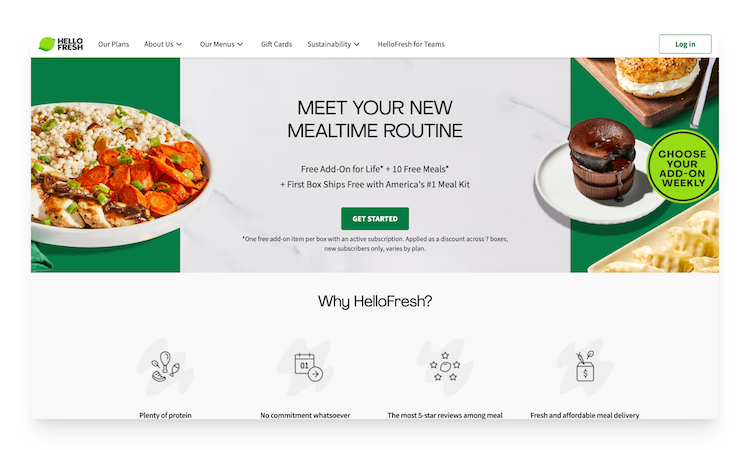
HelloFresh subscribers begin by selecting a customized plan, which allows them to choose their preferred ingredients along with the number of meals and servings per meal. The plans offer different options to suit a variety of dietary needs and preferences, and customers are able to skip a meal or change or cancel their plan whenever they wish. Each week, subscribers receive their HelloFresh orders with fresh, pre-measured ingredients, step-by-step recipes, and nutritional information.
In addition to being the biggest meal-kit provider in the US, HelloFresh has operations in Canada, Australia, New Zealand, Japan, and Europe. It was founded in late 2011 by Dominik Richter, Thomas Griesel, and Jessica Nilsson and started selling its first meal kits in early 2012. By 2014, the company stated that it was delivering a million meals each month. According to Statista, HelloFresh had 6.64 million customers globally as of Q4 2023.
10. Fitness apparel
Fitness apparel is perfect for ecommerce because athleisure wear is booming, with customers on the hunt for stylish, comfortable, and performance-driven options for workouts and daily life. To thrive in this market, it's advantageous to focus on high-quality fabrics, a range of sizes, and designs that blend fashion with function.
Also be sure to showcase real-life models, add detailed size guides, and highlight unique features like moisture-wicking or eco-friendly materials. Regularly launching fresh styles and colors and engaging with customers on social media will help you build a loyal, active community!
Primarily catering to young adults interested in physical fitness, Gymshark is a fitness apparel and accessories brand based in Solihull, England. Launched in 2012 by Ben Francis and Lewis Morgan, who were both studying at university at the time, the company began by selling bodybuilding supplements online. In 2013, it expanded its product offerings to include its own line of fitness apparel designed and manufactured by the brand.
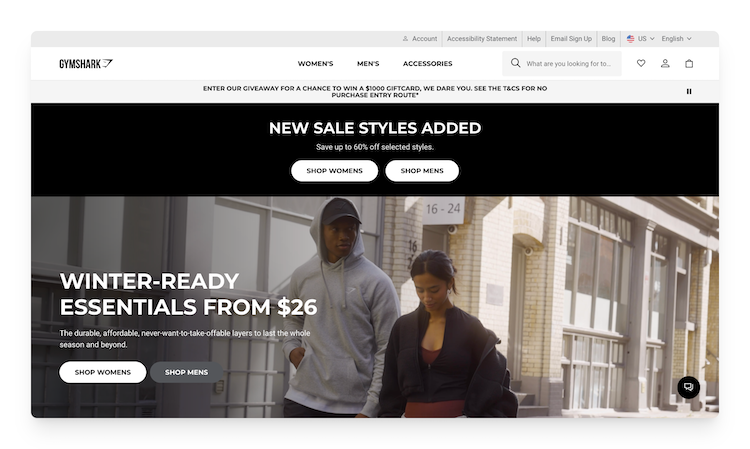
Since its creation, Gymshark has taken full advantage of the power of influencer marketing and online communities to increase brand awareness and build the business. That being said, the company’s first big break came through a more traditional marketing tactic, product showcasing at a trade show. Putting the brand’s Luxe tracksuit on display at the Birmingham BodyPower fitness trade show in 2013, Gymshark sold out of the product the first day. The tracksuit later went viral on Facebook, earning £30,000 of sales in only half an hour!
Today, the company has websites in 13 different languages and sells directly to shoppers in 180 countries around the world. While Gymshark is mainly an ecommerce business, the brand did open up its first permanent physical store in London in 2022.
11. Online courses
Want to share your knowledge and earn passive income at the same time? Consider catering to a massive audience eager to learn new skills and sell online courses. Begin by choosing topics you’re passionate about and have expertise in, ensuring high-quality video content and downloadable resources.
In addition, aim to make your course navigation intuitive, and be sure to add quizzes or certificates for engagement. As far as the sale of your digital course goes, you can either avail of e-learning platforms like Udemy, Kajabi, Thinkific, etc. or create your own ecommerce website. Once your course is ready to go, you can then promote it through blogs, social media, or webinars to attract learners.
A great example of an ecommerce entrepreneur in the e-learning niche is former teacher Kayse Morris, who built a seven-figure business by helping fellow teachers earn extra income through online courses and resources. She launched The CEO Teacher\u00ae program to guide teachers in creating and selling educational resources online.
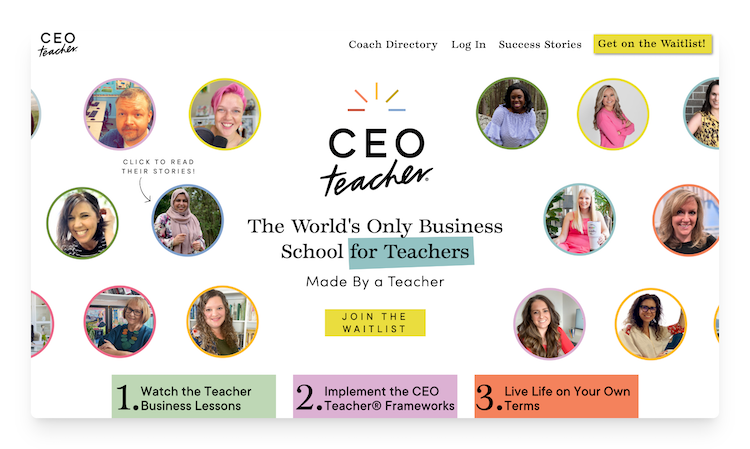
After a highly successful first course launch, Kayse expanded with additional resources and a podcast, gaining a large, engaged following. Her commitment to empowering teachers remains central to her brand's success.
What does it take to have a successful online store?
As with traditional commerce, ecommerce has both advantages and disadvantages. Nevertheless, one aspect that makes the idea of creating an online store particularly appealing is that it’s generally much easier to start your business. And if you have a stellar product in mind that you’d like to sell, you’ll of course want to begin selling ASAP and earning revenue!
As we’ve seen in the examples above, you don’t have to have loads of funding to launch an ecommerce business. However, there’s a big difference between simply creating an online store and having a successful online store. Many people getting started in web sales quickly learn that what works for one brand may not be such an amazing idea for another.
While there’s no one-size-fits-all recipe for success in ecommerce, one common theme found in businesses that tend to do well is the notion of putting the consumer first with the products and services they offer. This also means having a high-quality website to sell on, one that provides customers with a great shopping experience and makes every customer want to return for future purchases. The WiziShop ecommerce platform is more than happy to assist you with this key element of your new business!
Using one of the platform's many design templates, you’ll be able to create a homepage that perfectly suits your brand image. Take advantage of our hundreds of pre-integrated tools designed to boost sales and make managing your online store and marketing your digital commerce business even easier. Our 50+ technical SEO features can help your website start to climb the rankings on Google and attract more traffic and boost conversions.
Furthermore, you’ll find that you'll be able to avail of free training on a variety of ecommerce-related topics, get advice from our professional team of Business Coaches on anything concerning your site and business and use our handy artificial intelligence to generate different kinds of text content for your store in a flash.
Get started with your ecommerce adventure today by testing the WiziShop platform with a 7-day free trial!
Try WiziShop free for 7 days
THE EASIEST NO-CODE ECOMMERCE SOLUTION✅ No credit card required
✅ Access to all features
✅ No commitment
Ecommerce business FAQ
What is an ecommerce business?
An ecommerce business is a digital storefront where products or services are sold online instead of a physical store. Shoppers browse, select, and purchase items with just a few clicks, making it ultra-convenient. It’s like having a store open 24/7, reaching customers worldwide from any device!
What are some of the most successful ecommerce companies?
Some of the most successful ecommerce companies are, for example, Amazon, dominating global retail and venturing into; Alibaba, leading in Asia; eBay for its auction model; and Walmart, which began with physical stores and has grown rapidly online. These businesses succeed by leveraging user-friendly platforms, massive product ranges, and fast, reliable logistics.
That being said, even if your digital commerce business isn't going to compete at the same level as the aforementioned big-name online stores, you can still be successful with the goods and/or services you sell. Finding the right niche product and customer base is key!
How do you start a small ecommerce business from home?
Starting an ecommerce business from home is an exciting venture that begins with picking a niche—whether it’s handmade crafts, unique pet supplies, or meal kits. Once you’ve honed in on your idea, research your target market to understand their needs and shopping habits.
Next, choose a stellar platform like WiziShop to set up your online store, where you can showcase your products with engaging photos and descriptions. Don’t forget the essentials: a secure payment gateway, reliable shipping options, and marketing strategies like social media and email.
With dedication and customer focus, you’ll turn your home into a thriving online business hub!
What is the best kind of product to sell when you start an online store?
The best products to sell online are those that solve specific problems, cater to niche interests, or offer unique value—think eco-friendly goods, pet accessories, or handmade items. Ideally, they’re easy to ship, have a clear target audience, and aren’t oversaturated, making it easier to stand out.
How do you market an online retail business?
To effectively market an online retail business, focus on knowing your customers and what resonates with each type of consumer. Leverage the social media platforms where your target audience already spends time, using engaging visuals and clear value propositions.
Also be sure to encourage customer loyalty with special offers and build trust by showcasing reviews. Successful businesses sell not just products but a great customer experience, helping them stand out in a competitive online marketplace.


